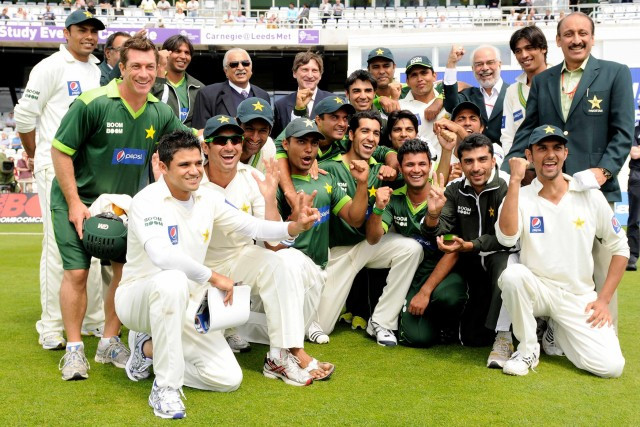It is nothing less than a cricket lover’s dream to watch the Pakistan cricket team when on song. From the sublime Imran Khan to the charismatic Shahid Afridi, Pakistan has constantly churned out cricketers who are not only among the best in the world, but are also among the most loved.
It is so easy to get carried away with the talent that Pakistan constantly throws at the world scene, that we forget to dig deep into the reasons for the constant failure of this team to live up to its potential. Pakistan has been trying to rebuild for the last couple of years. It is apparent that while they’ve had sporadic successes including the coveted T20 World Cup in 2009, the team has underperformed consistently.
While I congratulate the Pakistan cricket team which defeated Australia to level the series in England, under a young captain leading the team for the very first time, this day also serves as an opportune moment to reflect on the past and evaluate what went wrong. The ghosts of Sydney might have been eclipsed by the victory at Headingley, but is this triumph ephemeral or not, only time will tell.
The biggest hurdle in the redevelopment of the Pakistan team after the exit of Inzamam ul Haq has to be the Indian Cricket League (2007). With players like Muhammad Sami, Imran Nazir, Taufiq Umar, Abdur Razzaq, Rana Naved ul Hasan, Shabbir Ahmed, Imran Farhat and of course Muhammad Yousuf (though he did not play) signing up with the rebel league, one saw a chunk of the top 20 odd players in Pakistan suddenly being unavailable for selection. This event had an impact, not only on the other players and the cricket loving audience in Pakistan and around the world, but it also had a negative cascading effect on the cricketing culture in Pakistan. Although, India was in a similar situation with many Indian youngsters being lured into the ICL, the BCCI did a reasonable job of making sure that none of the top 30-40 players played in the rebel league. This is evident from the fact that while most of the Pakistani cricketers who played for the ICL are once again, after the amnesty, representing Pakistan at the highest level in at least one form of the game, not a single Indian ICL player has made his mark felt at the topmost level. Add to that the criticism and anger that top players like Muhammad Yousuf, arguably the best batsman Pakistan have ever produced, sought from the Pakistani public and the management as they, to put it in black or white, were accused of picking money over country. Kindly bear in mind that the situation became all the more precarious as the players had opted to play for an Indian rebel league. This actually begs the question, whether it was the ICL which was one of the hurdles for Pakistan cricket, or the players themselves.
Pakistan was, and is still grappling with leadership crisis. Let’s hope for the sake of Pakistan as well as for the sake of international cricket that Salman Butt provides an answer to all woes, but first, let’s remind ourselves that Butt was never the first choice. Pakistan has tried as many as five captains in the last couple of years in different formats, but it never really ‘tested’ them. No captain was given a run long enough or control strong enough, to make his presence felt, although a part of the blame must be borne by the captains themselves. Pakistan made a mistake which most teams have made in the past- naming the best batsman in the team as captain. Mohammad Yousuf was like fish out of water for a few months that he captained the side, and he was virtually ostracised when he sought to justify his adamant claims to stay on. Shahid Afridi’s tryst with the Test match captaincy can be best described the way we have come to describe his batting - short and flattering to deceive.
I, for one, had a lot of confidence in someone like Misbah ul Haq and considered him to be a potential leader. In many ways he reminds me of MS Dhoni, emotionless, nonchalant on the field with a sharp cricketing mind and of course sufficient cricketing ability to boot. Although Misbah is not as flamboyant as Dhoni, he was perhaps just the calming influence and a foil at number four that the otherwise restless team desired. But, not a single player was groomed for captaincy under Younus Khan. I do realise that Misbah was not getting any younger, but Anil Kumble lead India successfully at the age of 36 and facilitated the transfer of reigns to MS Dhoni. At that juncture Pakistan needed a leader who could do just that - lead Pakistan in the interim period while one groomed a leader for the future under him. That was a trick that Pakistan perhaps missed. Not knowing who the captain for the next series is never easy, let alone during a rebuilding phase.
Doping scandals, bans, and match fixing allegations are like summer, monsoon and winter for Pakistani cricket fans. All three follow in the same cyclic manner each year. Add to that another ingredient, constant, but especially dominant in the recent time - infighting. As a Pakistani supporter, I would either tear my hair out each time I saw such events jolt Pakistan cricket or make up my mind to just stop following it. But the passion for the game, which alone has the power to bring a smile, on the whole of Pakistan, when the country is otherwise grappling quite literally with terror, is impossible to be reconciled with.
The only people who have answers to this are the players. They need to ask themselves the simple question: Who am I playing for? If the answer is anything other than – for the millions of people who have faith in me- there is something wrong with the priorities of that player. When one looks at the team on the park, it is very simple to gauge whether the whole team is playing for Pakistan. It is not uncommon to see players playing to prove a point to someone or just not showing enough desperation to win the game.
Another problem that needs to be grabbed by the horns is the lack of youngsters pushing the seniors to make the cut for the final eleven. Despite a dismal performance for more than a couple of seasons, Kamran Akmal still continues to play for Pakistan. Shoaib Malik who can be best described as a bits and pieces cricketer is still playing the five-day format. I am not suggesting that there is dearth of talent, in fact that has never been the case, and will never be. The problem is that the selection committee and the administration have never allowed a settled side to play for six months. Do all of us remember who Khurram Manzoor is? And will we remember Umar Amin and Azhar Ali six months from now? We should, provided they are given the right amount of time to settle in.
But God has always been kind to Pakistan, and in spite of its shortcomings, Pakistan has always boasted of some of the best talent in the world. While Muhammad Aamer is the best young fast bowler on display at the moment, Umar Akmal is perhaps the finest young batting talent on the scene. Muhammad Aamer gives the impression of having a good head on his shoulders. He is learning from each game and is making the right noises as regards to his attitude. If all players in the team had similar attitude and hunger to learn, Pakistan can replace and stay as the number one cricket playing nation in the world. They have the arsenal to do just that. With Muhammad Asif back in the mix, he, along with young Aamer and Gul, with Muhammad Sami and Shoaib Akhtar waiting in the wings, compose the best fast bowling attack in the world. The problem is, as has always been, the batting, but if the current lot shows a bit of ticker and patience, things can fall in place. I won’t be surprised if at least one, from among Younus Khan or Muhammad Yousuf make a comeback. Whether that would be a retrograde step, or a step in the right direction will only depend on the attitude of these players who would have to learn to play under a young captain and be treated at par with the rest.
Will the traditionally mercurial side be able to do it? Honestly, no one knows. But so long as they keep producing my all time favourite cricketers (read: Waqar Younis!), I have no reason to complain. One can take cricket out of Pakistan, but it is impossible to keep Pakistan out of cricket. And that is exactly how it should be.
As an outsider, I may have missed or glossed over an important event, but as a connoisseur of the game, all I want is for Pakistan to be able to realise its full potential on the world scene. It only adds the much required spice to our sport.
The recent dynamics of Pakistan cricket
Doping scandals, bans, and match fixing allegations are like summer, monsoon and winter for Pakistani cricket fans. All three follow in the same cyclic manner each year.



COMMENTS
Comments are moderated and generally will be posted if they are on-topic and not abusive.
For more information, please see our Comments FAQ